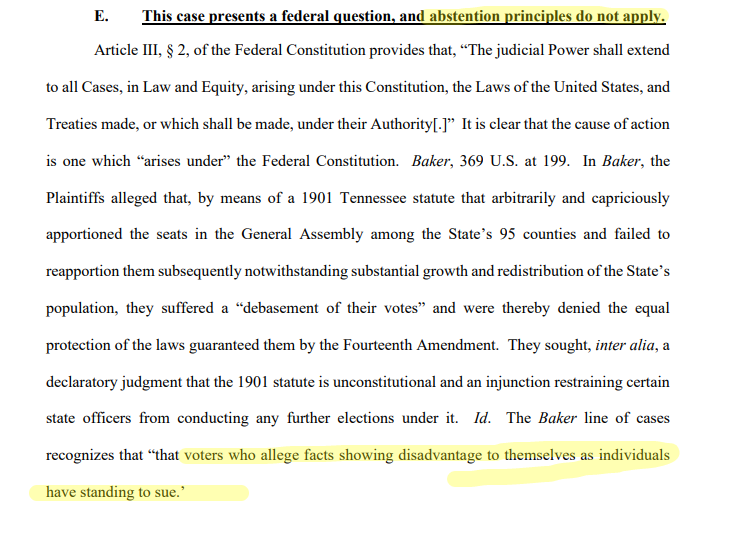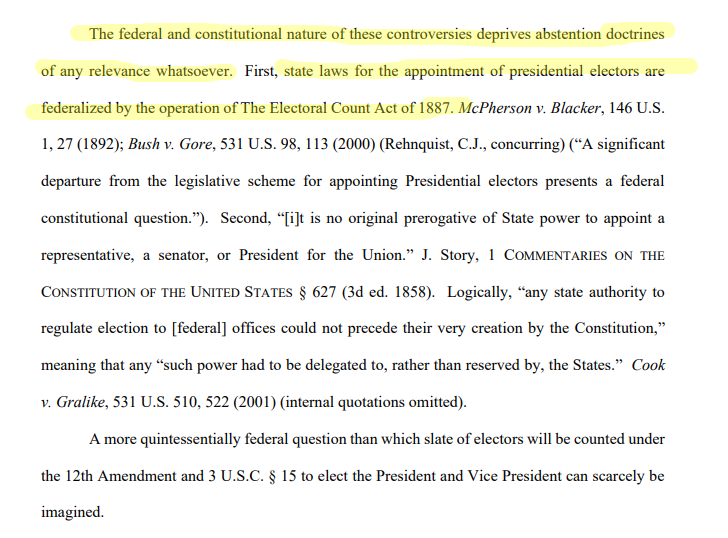
OK, as promised, a live-read thread on Gohmert's motion in the stupid "the VP gets to pick the next President" litigation.
I'm not going to repeat stuff I addressed when I went through the complaint so if you need a refresher, start here
I'm not going to repeat stuff I addressed when I went through the complaint so if you need a refresher, start here
https://twitter.com/AkivaMCohen/status/1343590453917208578
So first of all, let's see what they're asking for. An expedited decision on the case, and permanent injunctive relief (i.e. an order directing Pence how to act when counting electoral votes) and they want it by Thursday the 31st. The second two screenshots are the local rule 



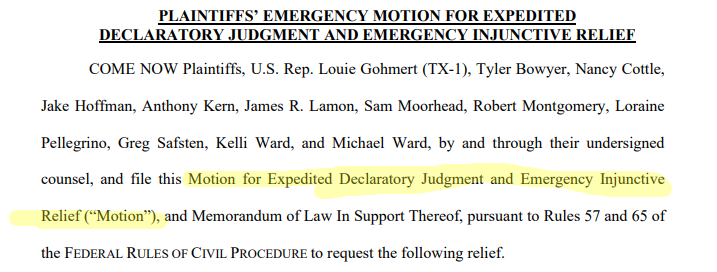
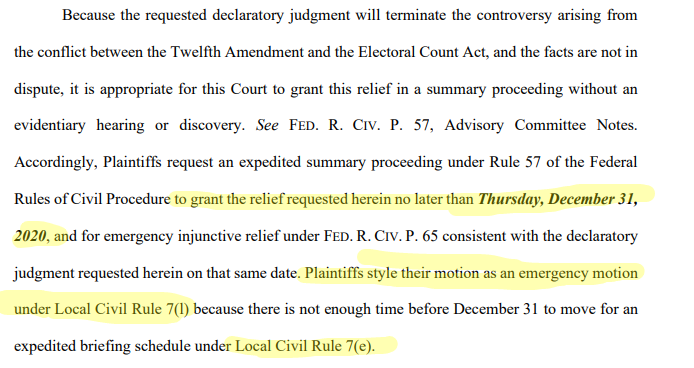
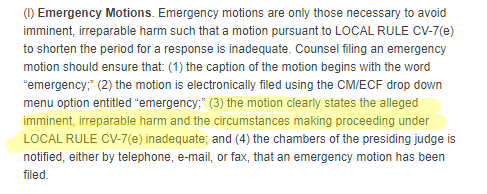

They do not, however, explain why 12/31 is the magic date (when the acts they're worrying about would be on 1/6), and there's a slight logistical problem in asking for a schedule that requires a ruling on a motion in 3 days when you HAVEN'T YET BOTHERED TO SERVE THE DEFENDANT 
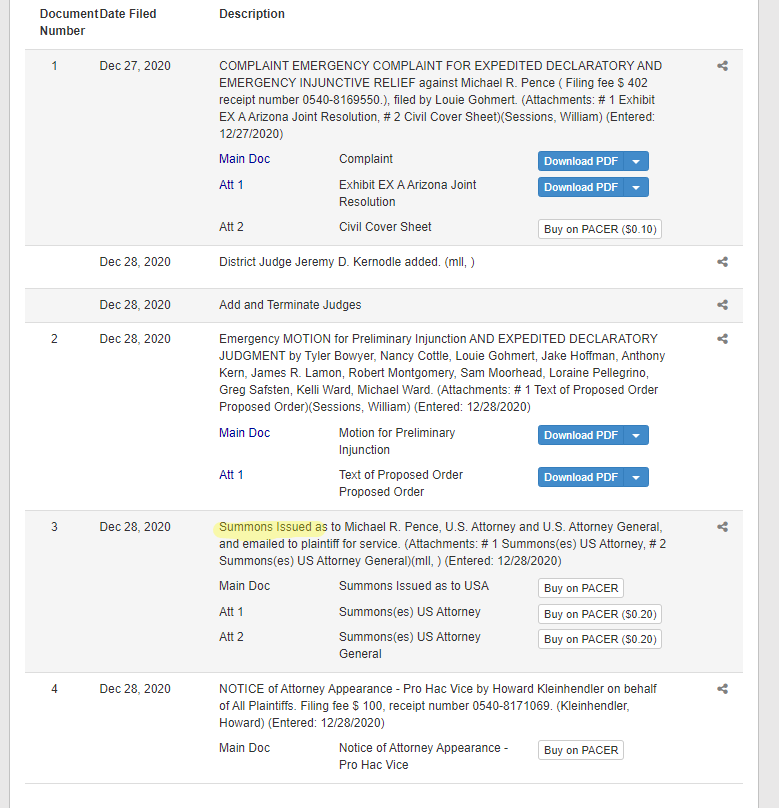
For my non-lawyer friends: a lawsuit doesn't start until the Defendant is formally served with process - a copy of the Summons and Complaint so they know where to show up. You can file a complaint, and the Defendant can know about it - like, say, if it's been all over the media -
but until you actually formally serve them, the case has not started. You only have a few months to serve the defendant, and if you don't do it in that timeframe your case will be dismissed
Here, of course, they're not going to wait months to serve. But to serve Pence - who was sued in his official capacity - the plaintiffs need to serve the United States Attorney General AND sending a copy of the Summons and Complaint to Pence himself by registered mail
This raises some problems. When you serve someone by mail, they get 3 days added to their time to respond to your suit. In theory, the earliest Pence could be compelled to respond to anything, if he got served by mail *today*, would be ... Thursday, 12/31. And I don't see any
request by Gohmert's team to address when Pence would need to be served to trigger a faster response. In any event, there's no universe where the court orders a response the day that a defendant is served, especially not on a suit that could've been filed weeks ago
OK, this is like 8 levels of weird. The table of contents comes after the intro to the motion? And lists "Table of Contents" in the table? Probably just a variation in local practice, but ... weird. 
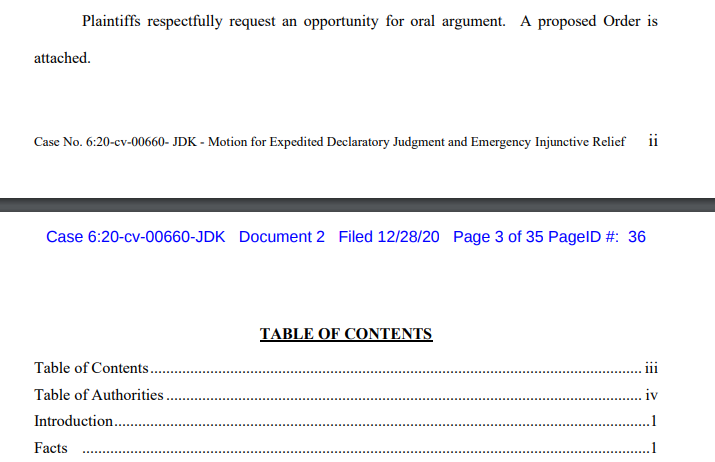
This is, however, a competent table of contents (though I'd have put subheadings in the "Facts" section). First addresses jurisdiction & standing, which is a clear issue and one the court has to find before it can reach the substance, then goes through the factors for injunctions 
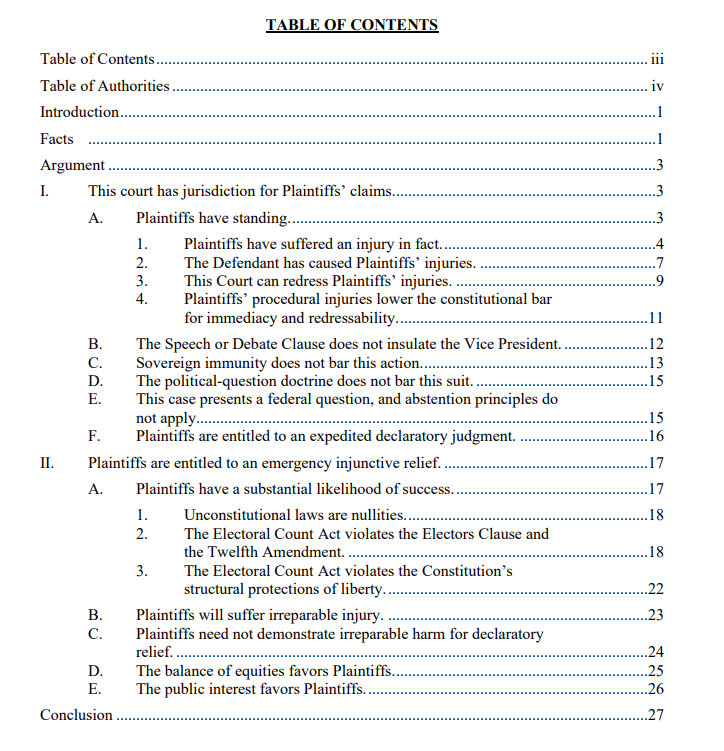
To get injunctive relief while a case is pending you need to show (1) a likelihood of success on the merits; (2) irreparable harm if you don't get the injunction; (3) that it's fairer to grant the injunction than deny it; and (4) that it's good for the public
And their ToC outline walks the court through those factors.
But it's also the wrong test here. They're not just asking for a preliminary injunction to maintain the status quo (don't let them sell my stuff while the case is pending, so I can actually get it back if I win")
But it's also the wrong test here. They're not just asking for a preliminary injunction to maintain the status quo (don't let them sell my stuff while the case is pending, so I can actually get it back if I win")
They're asking for an expedited hearing on the whole case, and a final decision. So I wouldn't have made the preliminary injunction the focus of my brief - I'd have basically said "here's why we win", and then as an afterthought "but if you think you need more time to rule for us
then give us a preliminary injunction in the meantime, because we *at least* satisfy that"
No major substantive difference, they're going to hit the "here's why we win" under likelihood of success (and they don't, so it's moot anyway) but it would be better advocacy
No major substantive difference, they're going to hit the "here's why we win" under likelihood of success (and they don't, so it's moot anyway) but it would be better advocacy
No. Come on. Law students, don't EVER do this. The Court is NOT going to go hunting through your Complaint, or whatever other document you're "incorporating by reference", to find facts that might support your argument. If you don't mention them in your brief, *they don't exist* 
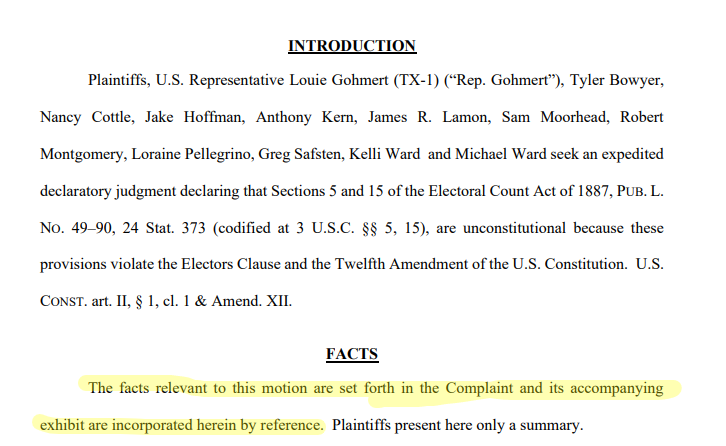
And holy hell, even law students know not to do THIS. What the hell, guys? This (plus that "incorporation by reference" bit) is their entire statement of facts. Note all the yellow highlighting of blank spaces? That's where the citations should go 



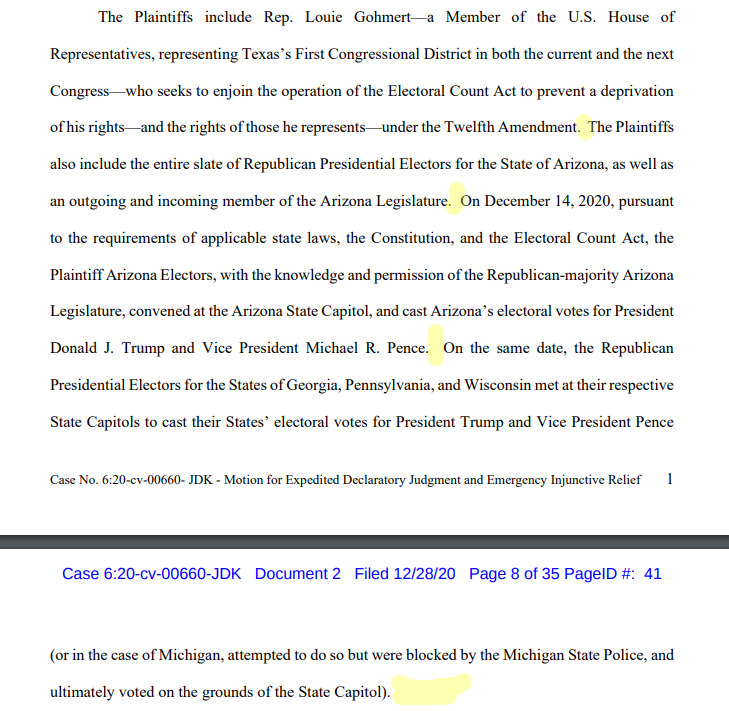
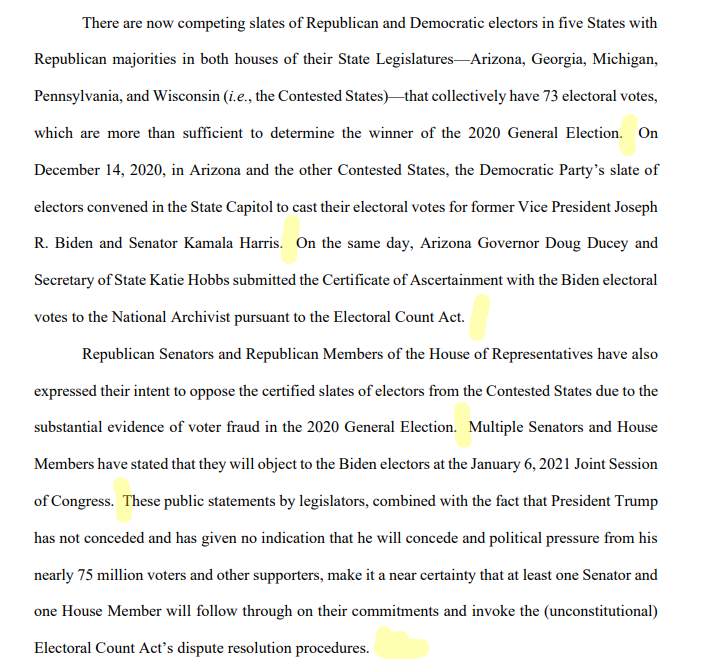
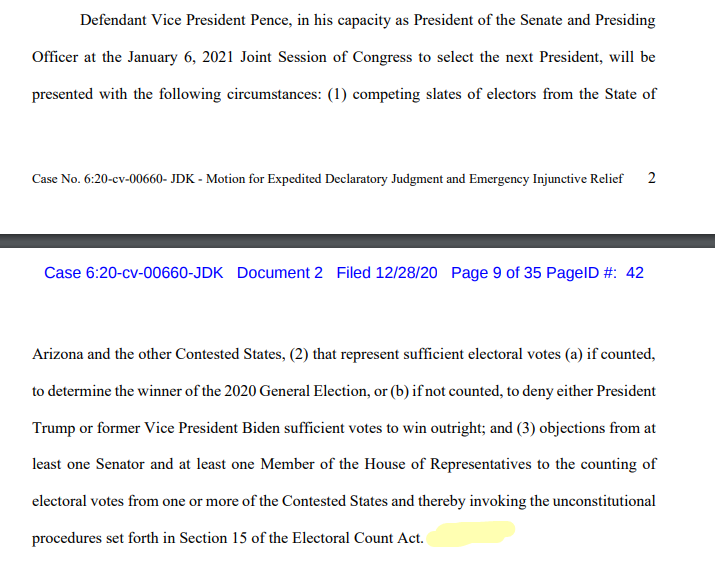
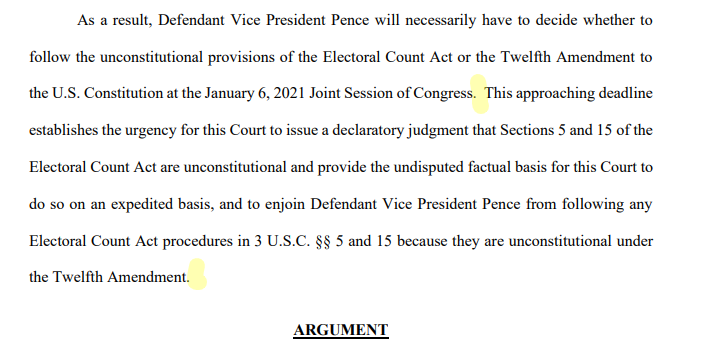
Look, some things about court are basic and fundamental. The Court's role is to apply the law to the particular facts of the case. Parties often fight about what the law is, and the Court has its own view of the law, often a preexisting one
I promise you, the breach of contract case you retained me to file for you won't be the first breach of contract case that the Commercial Division or SDNY judge has seen, and they've written some decisions on what the rules governing contracts are. So it's my job to argue the law
but I'll be doing it to a judge with a baseline knowledge of at least some of the relevant concepts.
The judge has NO GODDAMN CLUE about the facts of your dispute with your business partner, and the only thing she's gonna know is *what we tell them happened*. And, of course,
The judge has NO GODDAMN CLUE about the facts of your dispute with your business partner, and the only thing she's gonna know is *what we tell them happened*. And, of course,
what your business partner says happened. And since those two stories are often in dispute, it's my job to convince the judge that your version of the facts is what actually happened (which it is, don't fucking lie to me about it, because I'm not lying to a court, got it?)
To do that, we can't just go up there and say "well, judge, here's what happened, trust us." We need to provide *evidence* for the things we say are the facts. Preferably documents and hard evidence, but at the very least sworn testimony from someone with knowledge
So the way a statement of facts works is like this: "Thing A happened. See [cite specific piece of evidence supporting claim that Thing A happened - Ex 1, or John Smith Aff, ¶¶ 4-6]. Then thing B happened, [cite] and, outrageously, Defendant did thing C. [Cite]"
The *single most important thing* in any statement of facts is not the "things you say happened" but the evidence you point to that will convince the court that yes, that's what happened.
Gohmert's statement of facts has ... none of that. Nothing.
Gohmert's statement of facts has ... none of that. Nothing.
It basically reads like this: "There are now competing slates of Republican and Democratic electors in five States with Republican majorities in both houses of their State Legislatures - trust us, would we lie to you?"
Worse, "well, we incorporated the Complaint" doesn't help them any, because even if the Court was inclined to go digging for evidence (it won't be), *the Complaint wasn't verified*
What does that mean? There are two types of complaint. Under oath, and not
What does that mean? There are two types of complaint. Under oath, and not
A complaint, generally, is not an evidentiary document. Its job is to put the Defendant on notice of what the case is about, but it's not evidence of any of the things it alleges.
A verified Complaint is different. If they want, Plaintiffs can "verify" their complaints - swear,
A verified Complaint is different. If they want, Plaintiffs can "verify" their complaints - swear,
(or affirm) that the allegations are true based on their personal knowledge, except when alleged "on information and belief" (i.e. "upon information and belief, Defendant hates me and wants to hurt my business" - it's his emotional state, you can't know it)
A verified Complaint does two things: 1) it functions like an affidavit (so it's evidence of the facts alleged); and 2) it forces the Defendant to respond to the Complaint under oath when they admit or deny the Complaint's allegations.
If Louie's complaint had been verified, he could actually have used it to support his motion. It wasn't.
Which means that Louie is *literally* asking for the court to rule he wins the case *without any evidence at all that the things Louie is claiming are true*
Which means that Louie is *literally* asking for the court to rule he wins the case *without any evidence at all that the things Louie is claiming are true*
Not only *won't* that happen, it literally *cannot* happen. A court can't rule in favor of a Plaintiff who comes to court without evidence. It simply can't.
This is ... I'm stunned at this level of incompetence. These people have filed motions before. They know this.
This is ... I'm stunned at this level of incompetence. These people have filed motions before. They know this.
Anyway, we're not going to go through all the reasons the facts in that section are wrong, we covered them in the earlier thread. But this is mind-blowingly crazy from a practice standpoint.
On to the argument
On to the argument
Oh my god.
@questauthority, I'd say I'll get you for this, but let's just call it even for "what do you mean the last 75 pages had nothing to do with the case?!"
@questauthority, I'd say I'll get you for this, but let's just call it even for "what do you mean the last 75 pages had nothing to do with the case?!"
This ... this is just incomprehensibly bad.
THIRD PARTY STANDING? Here? At this time of year, at this time of day, in this part of the country, localized entirely within your kitchen?


THIRD PARTY STANDING? Here? At this time of year, at this time of day, in this part of the country, localized entirely within your kitchen?
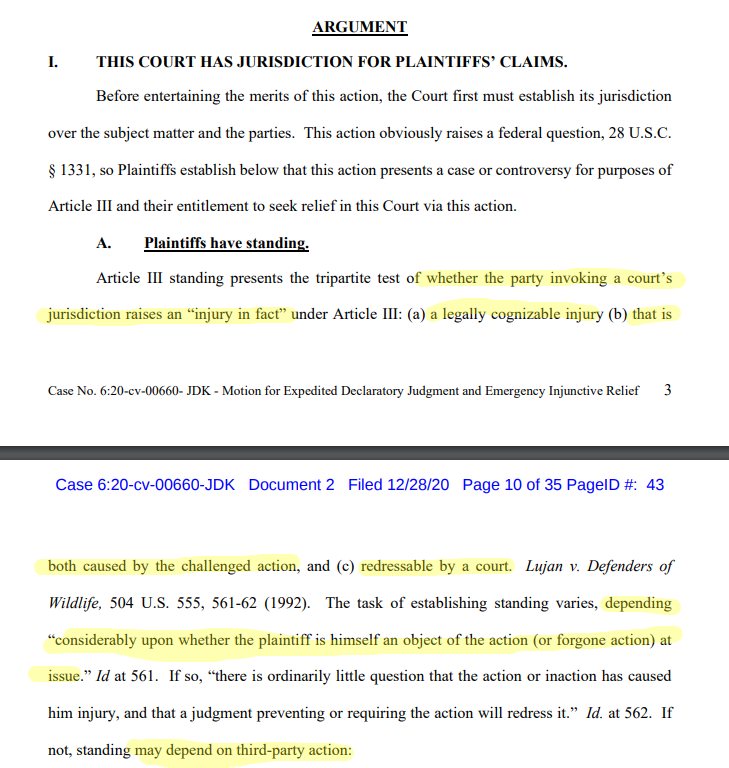
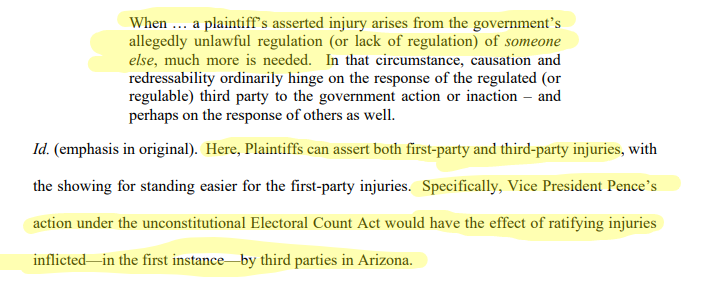
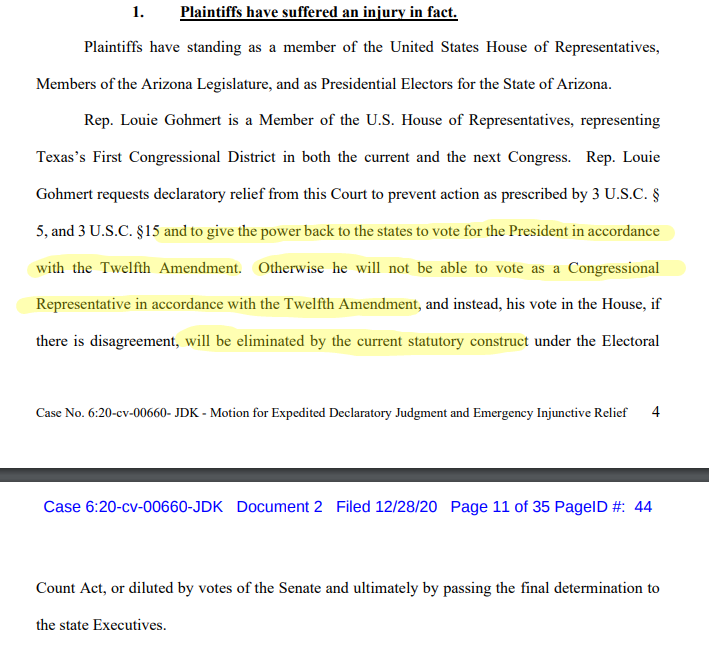
Meanwhile, Louie is claiming that if he's allowed to vote on objections under the Electoral Count Act, his right to vote, as a member of the House, in a contingent election under the 12th Amendment will be "eliminated" or "diluted by the votes of the Senate ..."
Set aside, for now, that votes under the Electoral Count Act are not made in the contingent election scenario addressed by the "Twelve Amendment". Set aside that setting a decisional rule of "we'll go with the certified slate" isn't "passing the final determination" to anyone
You've got a bigger problem, Louie.
You DO NOT HAVE ANY ability "to vote as a Congressional Representative in accordance with the Twelfth Amendment" - because under the 12A, *individual congresscritters DO NOT GET VOTES*. Only state delegations do.
So you've got no "personal right" to infringe and no "personal injury" to sue on (excepting that traumatic brain injury you've obviously been suffering with for so long)
This is impressively bad. Let's count the ways
1 The number of Dem/Rep majority delegations isn't "under the Twelfth Amendment" - it just is.
2 The "member" has no individual rights under the 12 A
3 Individual congressmen can't sue for infringements on the authority of the House
1 The number of Dem/Rep majority delegations isn't "under the Twelfth Amendment" - it just is.
2 The "member" has no individual rights under the 12 A
3 Individual congressmen can't sue for infringements on the authority of the House
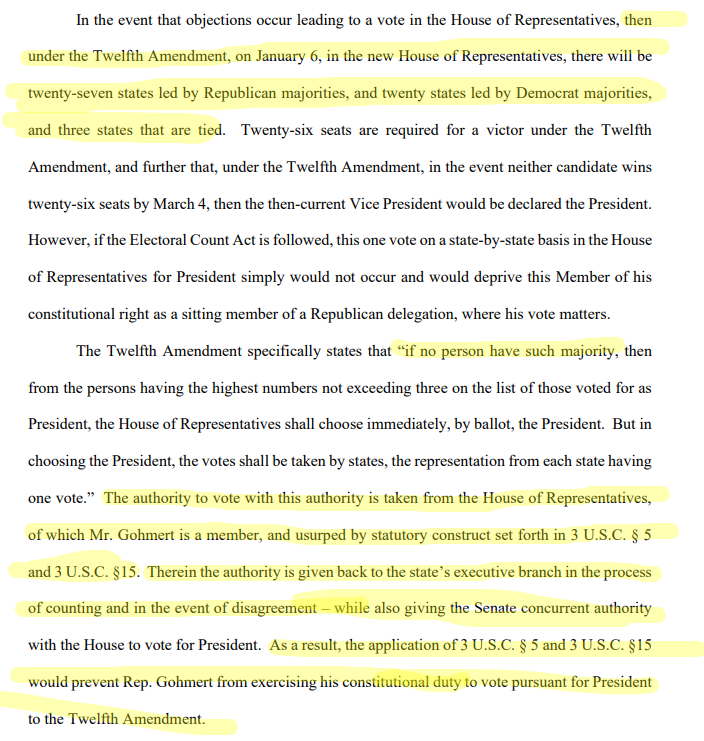
4 The ECA gives no authority to anyone but Congress to determine how votes get counted
5 Neither the House nor Senate "votes for President" under the ECA. You're just counting who the Electors voted for.
6 You have no personal constitutional duty under 12A
5 Neither the House nor Senate "votes for President" under the ECA. You're just counting who the Electors voted for.
6 You have no personal constitutional duty under 12A
All of which underlies a bigger problem: Gohmert believes that his job as a Congressman, when the Electoral votes are being counted, *is to vote for President*
That's not how it goes, Louie. You did that when you pulled the lever for Trump on 11/3. (Not-so-secret ballot, huh?)
That's not how it goes, Louie. You did that when you pulled the lever for Trump on 11/3. (Not-so-secret ballot, huh?)
But that time is gone, now. Your ONLY role and your solemn constitutional duty, on January 6, is to assess whether the electors being reported (as voting for Biden or Trump) were appointed as provided for under the Constitution
Now, considering your distinct lack of higher brain function, it's entirely possible that you actually believe, despite a series of brutal smackdowns by every court to look at the evidence, that none of the Biden electors are valid and they all should be tossed out. Ok. Fine.
Well, not fine, but your good faith is controlled by your subjective beliefs, not, you know, objective reality or basic rationality.
But if you think your job is to *reelect President Trump* - and everything you're saying here says you think that's your job - you're dishonorable
But if you think your job is to *reelect President Trump* - and everything you're saying here says you think that's your job - you're dishonorable
unfit for office, and should be impeached forthwith.
Anyway, back to the brief, which just recapitulates the Complaint's bad argument for the "Arizona Electors". But there's an additional problem we didn't discuss then. 
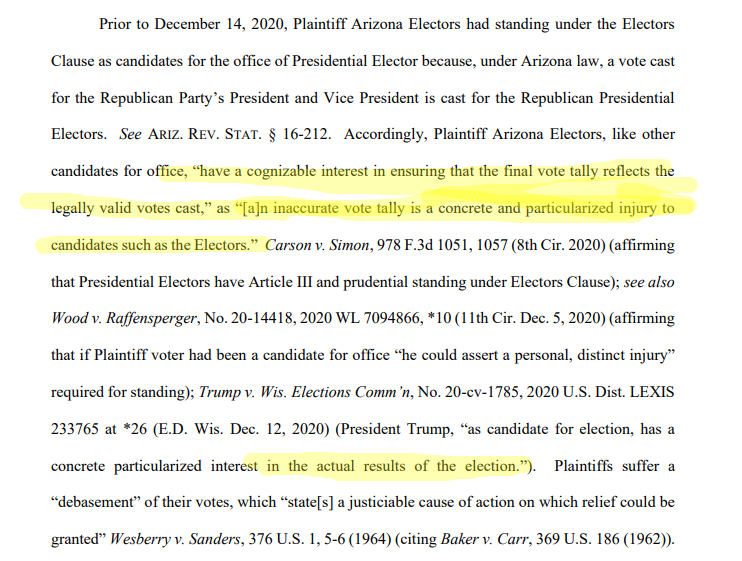
Whatever the "Arizona Electors" interest in having the election results tallied correctly, they have ZERO interest in the procedures by which Congress determines the outcomes of any objections to particular certificates of electoral votes (brb)
Sorry for the delay. A filing like this, at this hour, requires bourbon
Now on to injury being caused by Pence. Gohmert's argument is actually fine, if he had any personal rights to validate (he doesn't). But these Arizona Electors? Cuckoo for cocoa puffs 


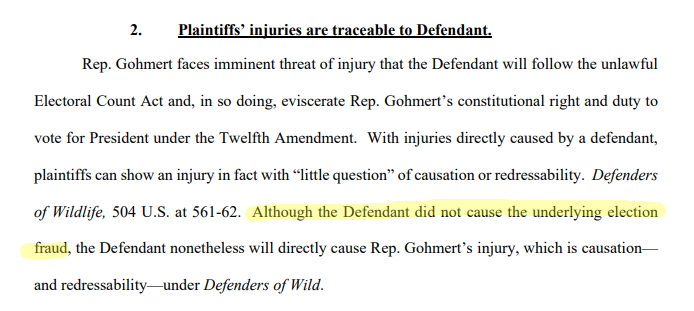
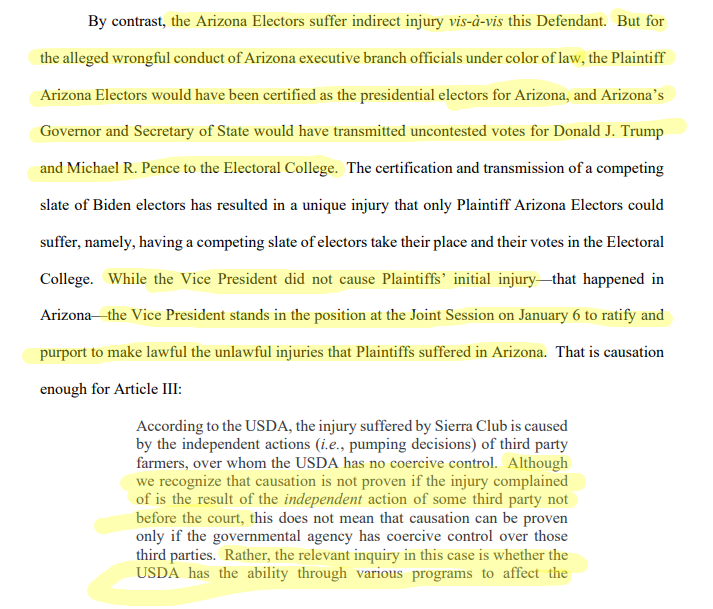
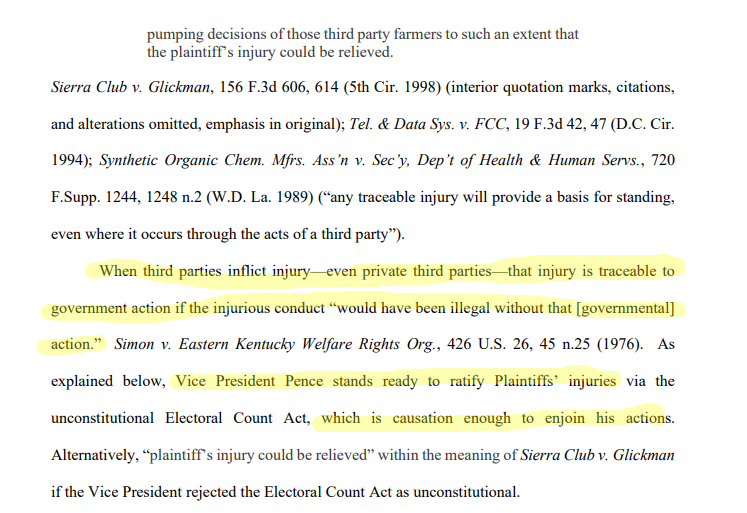
Start with the fact that *they were never appointed as electors*. Arizona's legislature chose to appoint electors by election, the certified winners in the election were ... not you guys ... & the State Legislature didn't separately appoint you (which wouldn't have been valid but
at least could have supported standing to *argue* that it should be valid). Instead, you just ... chose to get together *as though* you'd been appointed, and to "vote" on that basis. And you got 20-some members of the 90-person AZ Legislature to say "yeah, count these guys"
You're LARP electors. Cosplay electors. Electors in the land of make-believe (though Mr. Rogers would have taught y'all to be better losers and accept reality). You. Are not. A thing.
Which means that your injury from having the election "stolen," if any - and oh by the way, you don't get to skip the step of proving that injury actually exists by simply saying "no, it was stolen" and not putting in evidence - has already been baked in.
Pence isn't "ratifying" your injury by not counting your votes. You were never appointed as electors, so it would literally be unconstitutional for him to count your votes. Your injury is your lack of appointment, not "he's not counting us even though we weren't appointed"
Nothing Pence does on January 6 can remedy your "injury" - *including* if he somehow "waved the Pence Card" and counted your votes as the MAGA feverswamps think he can. You *still* wouldn't be electors.
The Electoral Count Act has jack shit to do with that. And nothing Pence does can fix it. Therefore, your injury isn't traceable to the ECA or Pence or fixable by anything the Court does. So you have no standing.
None of this is a thing. But just think through the implications of this insanity. According to Gohmert, in 2024 Kamala Harris will be able to simply refuse to count electoral votes from Alabama, Oklahoma, Louisiana, and any other red state she chooses, no matter how they vote 
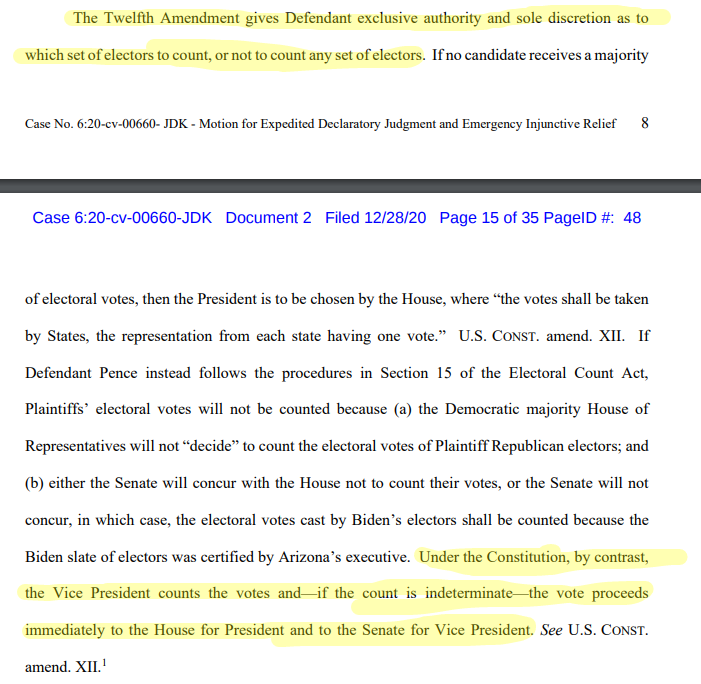
Like, I get it, Louie, your argument is the figleaf of fraud claims that courts have repeatedly rejected (might want to check that, it's getting kind of threadbare and nobody really wants to see that, no matter what Lauren Boebert's husband has been telling you)
But your argument is that the VP has "exclusive authority" and "sole discretion"
And I promise you, she could find plausible arguments that red states engaged in voter suppression as her own figleaf, if she wanted to.
Is that *really* how you think the Constitution works?
And I promise you, she could find plausible arguments that red states engaged in voter suppression as her own figleaf, if she wanted to.
Is that *really* how you think the Constitution works?
"Electors select the President, unless the VP disagrees with their choice, and then she counts only the Electors who voted how she likes" doesn't sound like a particularly workable system, Louie
This is a particularly special set of arguments. The Arizona Electors' injuries, if you recall 1 page ago, was "not having their vote counted". But even if their vote still isn't counted, declaring the ECA unconstitutional will fix their injury of not having their vote count 

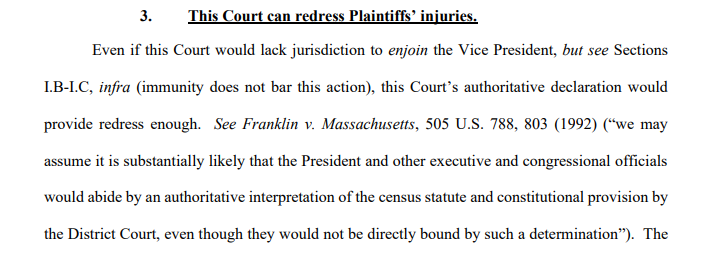
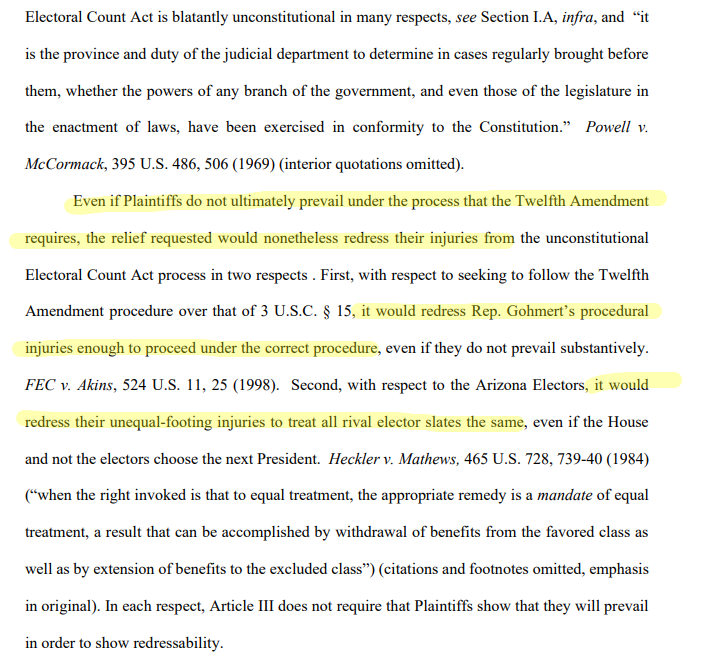
Oops, I WTF'd too soon. Not that that didn't deserve it, but where do I go from here. I mean come on 
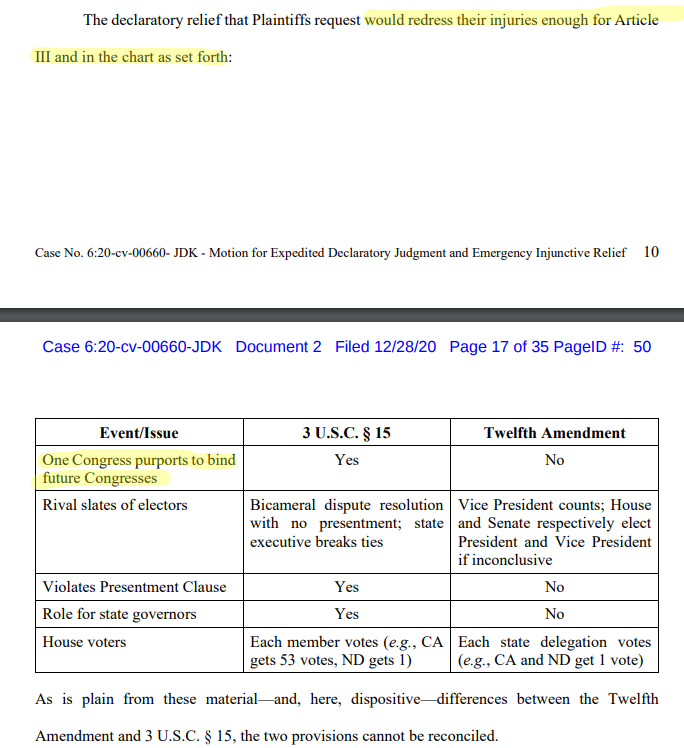
What the actual hell even is that chart? "This shows our injury of not having our electoral votes counted can be fixed by declaratory judgment because <checks notes> the 12A doesn't purport to bind future congresses which fixes our in...jury...not at all? What?"
I'd have to dive into the cases to deal with this & this suit is so stupid in so many other case-killing directions that it's not worth it. But excuse me, when did "voters from smaller states like Arizona" become a plaintiff so that the Court can consider their supposed injury? 

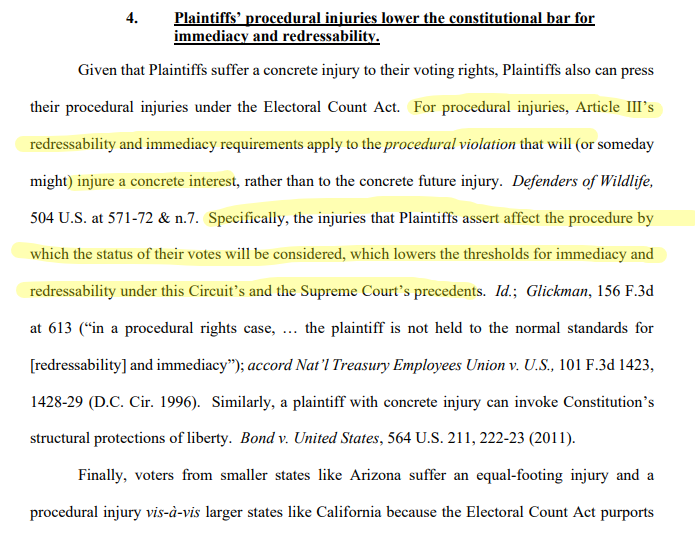
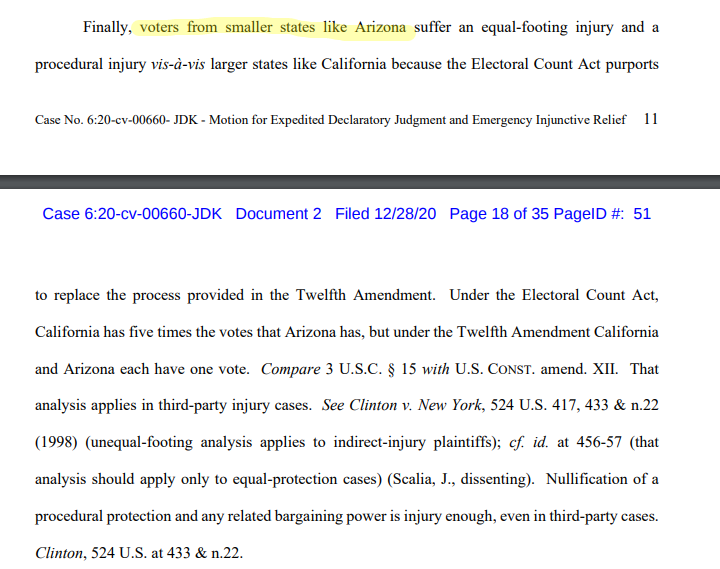
OK? Like, yes, I agree, the Speech and Debate Clause doesn't mean you can't sue to have the Electoral Count Act declared unconstitutional, but who would ever argue that that clause bars a constitutional challenge to a law?? Same for sovereign immunity. 



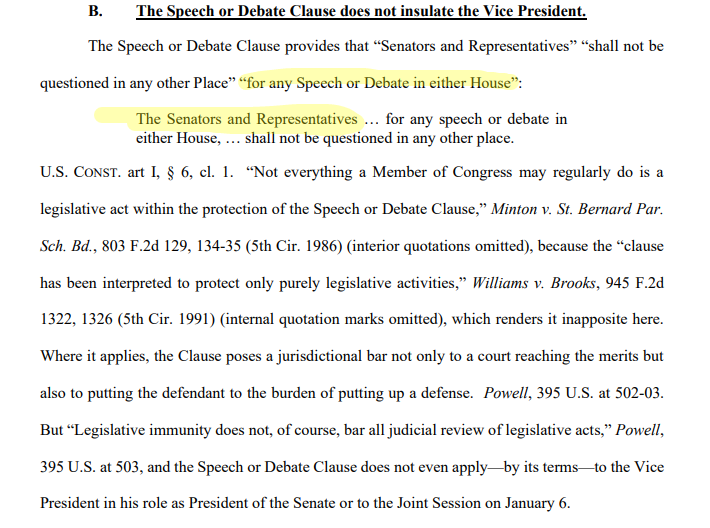
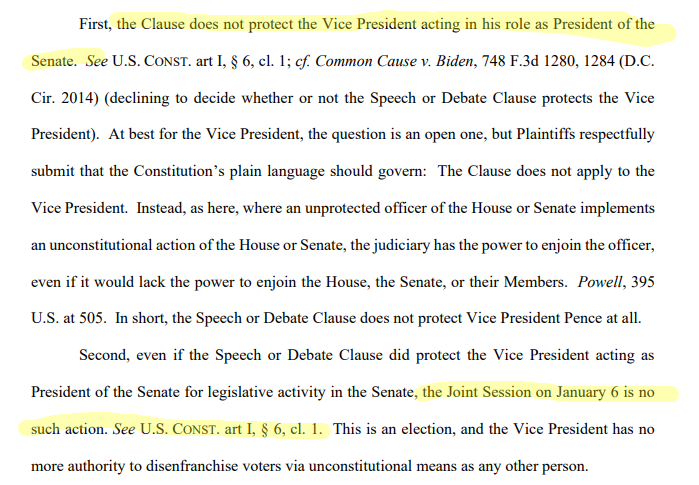
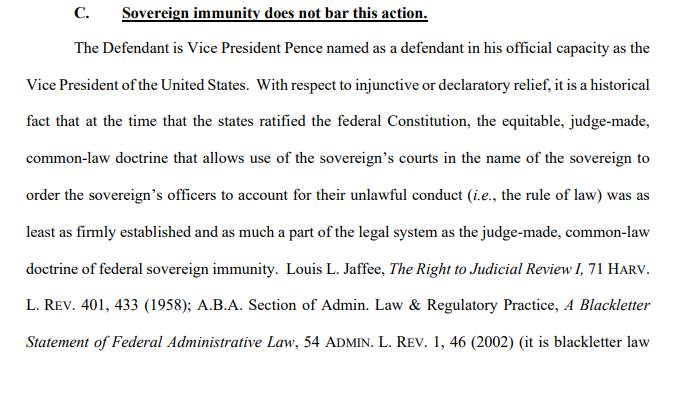
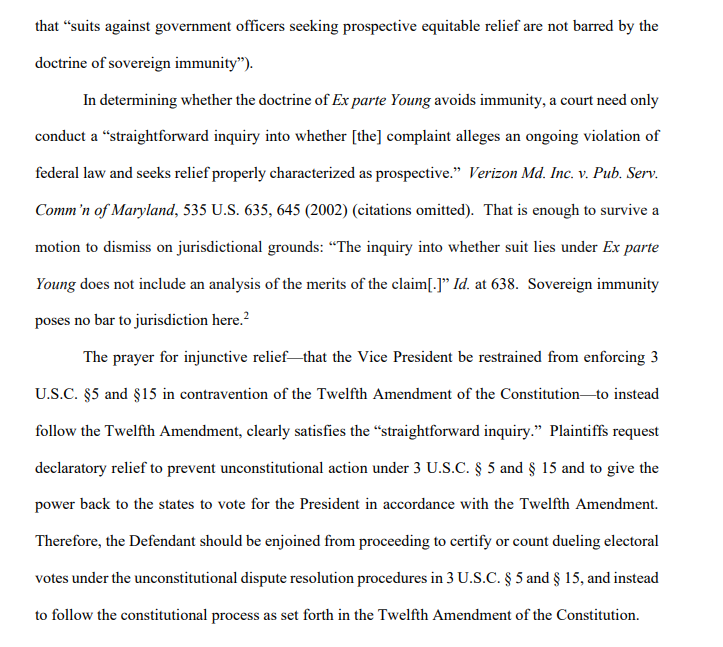
Which brings us to a practice issue. Yes, it's a good idea to address anticipated defense arguments in your opening brief, especially if you're not getting a reply. But don't waste the Court's time on arguments that aren't going to be raised at all.
Yes, sovereign immunity came up in various other suits. But that was specifically because those suits weren't seeking prospective relief from an unconstitutional law (claims that are exceptions to immunity under Ex parte Young). This case is. Nobody's going to argue this one
This, on the other hand, is lunacy. Political question doctrine basically means that the courts don't intervene in how the other branches handle their purely internal business (for example, fights between congress and the President). There is nothing more "how we handle internal 
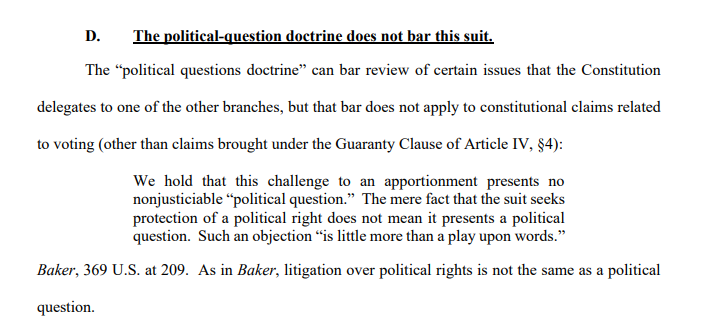
business" than Congress setting its own rules for how it will treat and decide objections to elector slates when fulfilling its duty to count the electoral votes, a duty imposed by the Constitution without providing any procedural guidance at all.
You cannot - CANNOT - deal with that issue in a one-paragraph, under 100-word "section" primarily comprised of a block-quote that stands for the proposition that "well, not EVERYTHING is a political question just because it involves politics"
OMFG, you MUST be kidding me
Your entire theory is "there are competing slates of electors" - which is a quintessential STATE law question (which electors did the STATE appoint in the manner directed by the STATE legislature), which state (and federal) courts have already ruled on. And your answer to that is
"well, the Electoral Count Act makes that a Federal issue?"
Motherfucker, you're suing to declare the ECA unconstitutional. You can't argue that the unconstitutional law is the basis for the court to take jurisdiction!
Motherfucker, you're suing to declare the ECA unconstitutional. You can't argue that the unconstitutional law is the basis for the court to take jurisdiction!
I mean look, this is actually an easy goddamn argument. "Whether the Electoral Count Act is unconstitutional is a purely federal question that state law cannot answer, by definition, so the Federal Courts cannot abstain on it"
But you left that on the table for your stock "don't abstain on our election law challenge" argument? Did you just forget which particular stupid argument you were defending here? What the hell??
OK, now we're back to "everyone agrees on the thing that nobody agrees with us on, and we didn't bother to cite evidence of" in the argument for "you can decide this fast" 

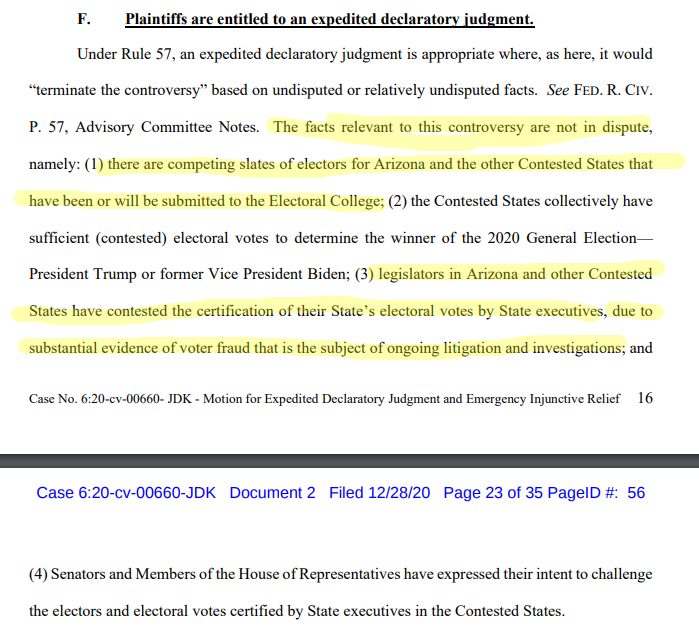
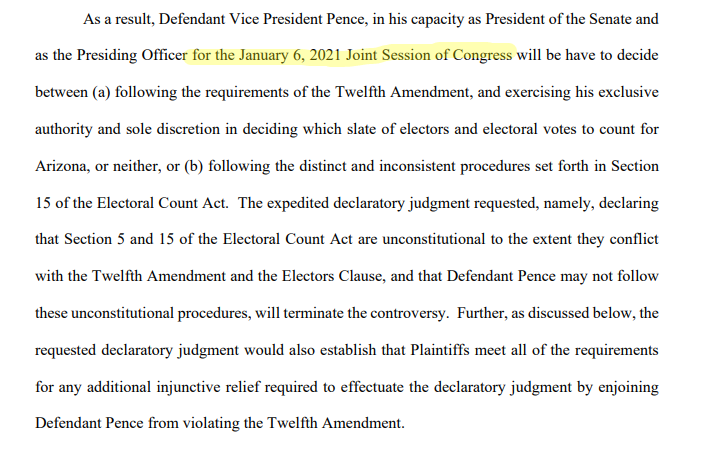
Likelihood of success. WHY are you wasting the Court's time arguing that unconstitutional laws have no effect. We know this. This isn't a thing you need to argue.
You saved your citations for THIS instead of the facts? Really?

You saved your citations for THIS instead of the facts? Really?
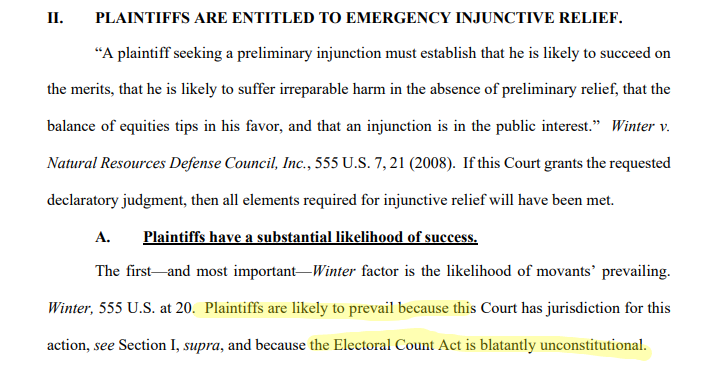
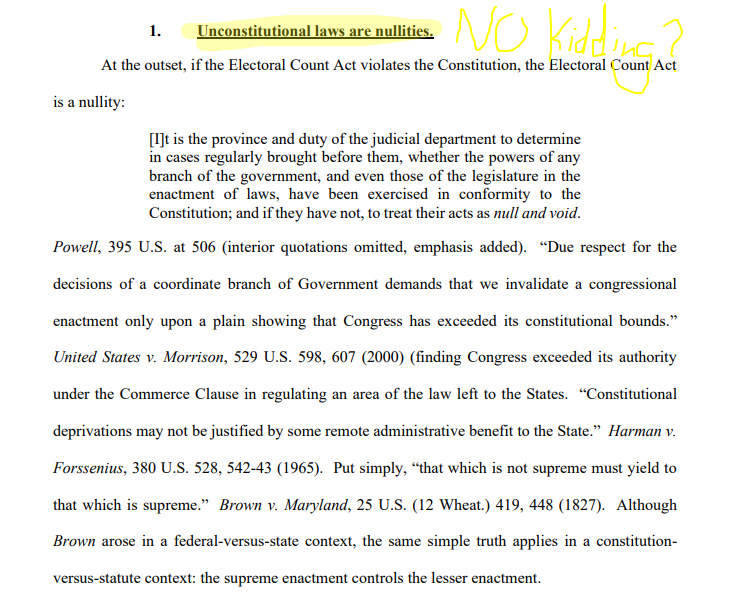
This is an incredible tactic and I look forward to never using it myself or seeing it ever again. "We've shown a likelihood of success on the merits because if we win it will be because the Court found our case has merit" 
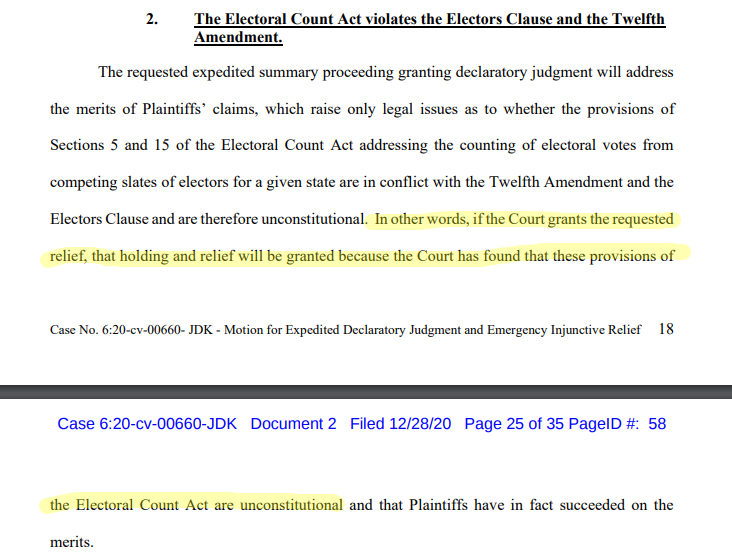
Yes, they get into the merits in detail next. But what the hell is this paragraph even doing here? It *does* nothing. It *adds* nothing. It *is* nothing. You could delete it from the brief with no ill effect. So why is it here?
The brief then goes back and just repeats the claim that the 12A and ECA conflict. They don't and we've been through why: they cover different things entirely. Look back at the thread from earlier <checks clock> I mean from yesterday if you want more detail on that
These are interesting arguments, which we discussed in the earlier thread (tl;dr: unless and until the House or Senate *as a body* wants to break away from the Electoral Count Act, they're irrelevant). 


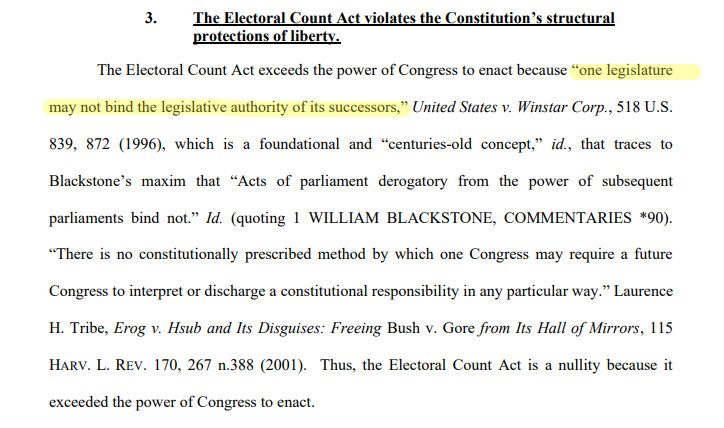

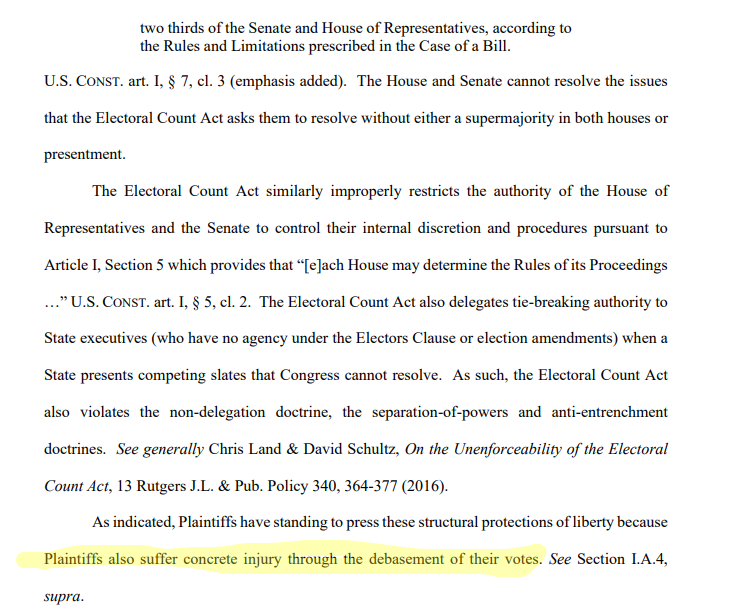
But also, they undermined the "can't bind subsequent congresses" argument with the completely unnecessary "speech and debate clause" section. Over there, you said that Congress counting votes wasn't "legislative". So how do you reconcile that with the highlighted quote? 
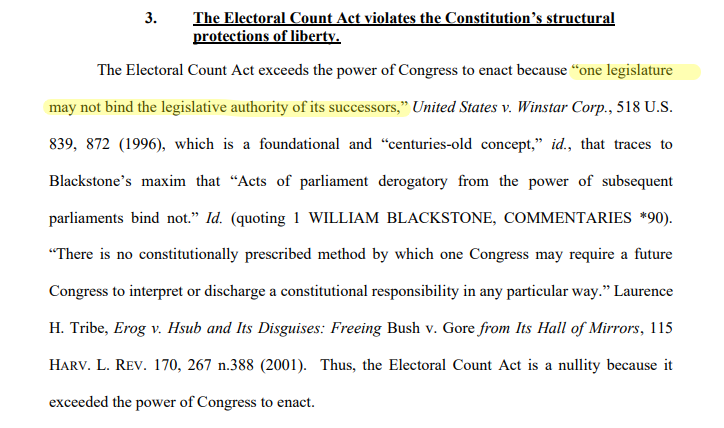
Going to skip the "irreparable injury" section; it's obvious that if the plaintiffs actually are injured by the ECA being followed on January 6, there's no possible remedy for that after it happens
I'm also going to skip the "we don't need irreparable harm for declaratory relief" section, because, well, it's completely unimportant here.
This, on the other hand, is completely and totally wrong.
The "balance of the equities" factor basically asks "which would be worse: granting an injunction and later realizing it shouldn't have been granted? Or denying it and later realizing it should have"
The "balance of the equities" factor basically asks "which would be worse: granting an injunction and later realizing it shouldn't have been granted? Or denying it and later realizing it should have"
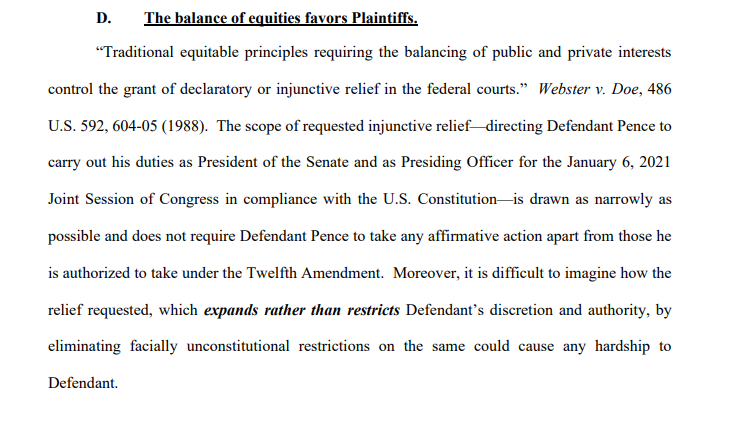
The harm if the court grants an injunction barring Pence from following the Electoral Count Act is, of course, massive and *just as irreparable* (if the court later found the act constitutional) as any harm to plaintiffs without an injunction
Whatever happens on 1/6 will have happened, and happened for good. If the court enjoins Pence from following the ECA and later decides "you know what? On reflection, Plaintiffs are wrong and this is constitutional" there's no going back and fixing it.
This isn't like a suit over a unique piece of art, where if you let the defendant sell it to a third party it's gone for good, even if the plaintiff wins, but if you restrain it and the defendant eventually wins he's just lost the ability to sell during the dispute.
Here, if you grant an injunction and the Defendant wins, you've irreparably harmed the Defendant (and the country). This is not a case where the balance of the equities can conceivably favor preliminary injunctive relief
Last, they're absolutely right that the public interest "collapses into the merits". The public has no interest in the enforcement of an unconstitutional law, and an overwhelming interest in the enforcement of a constitutional one. So ... 
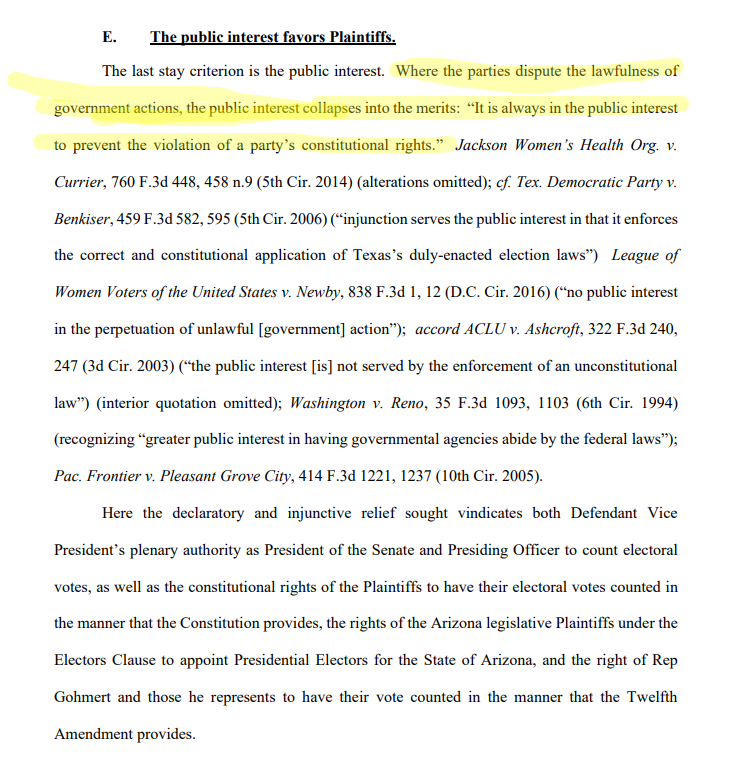
however the court rules on the merits, it will rule on the "public interest"
• • •
Missing some Tweet in this thread? You can try to
force a refresh
